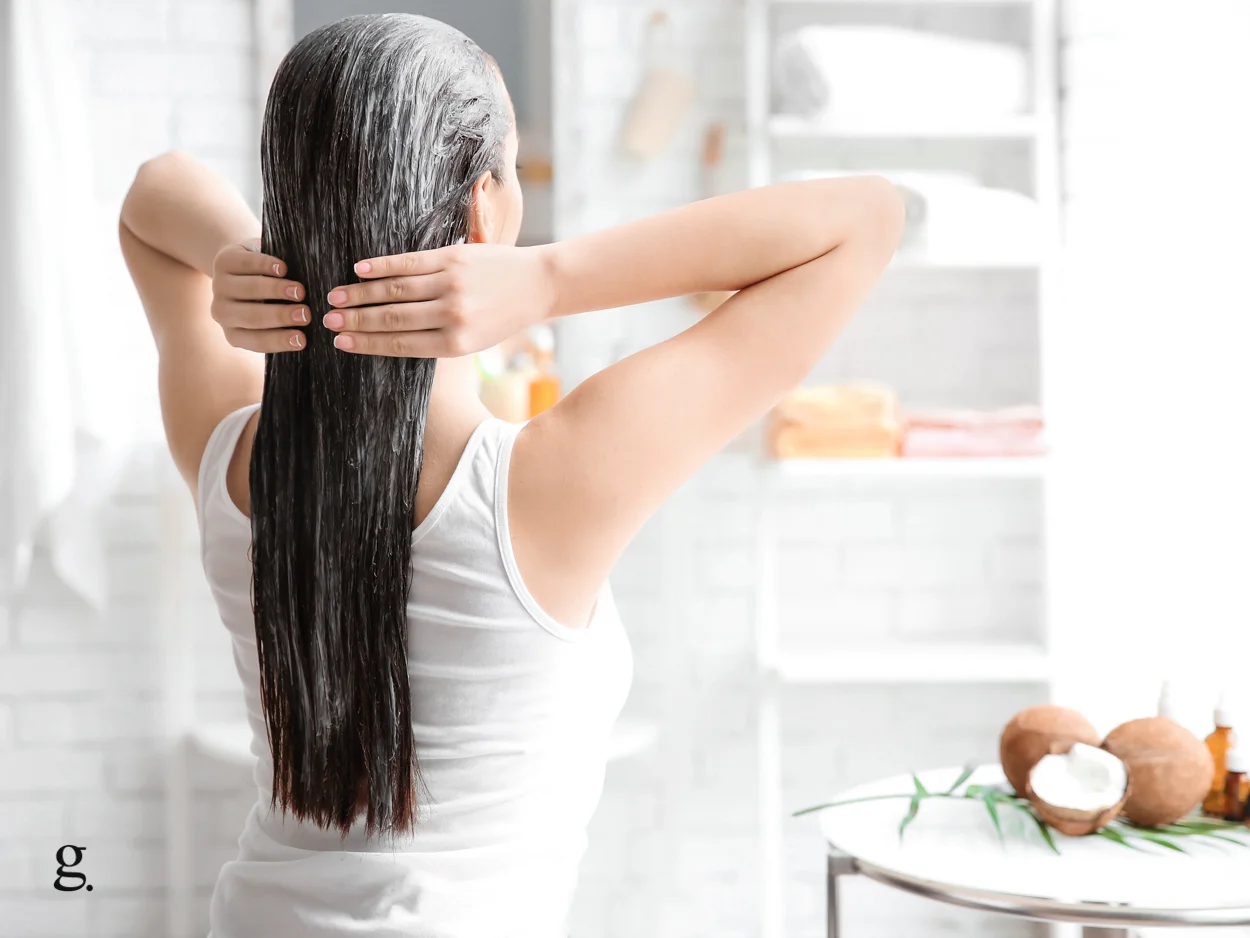Throughout our lives, our hair can take some serious punishment. From coloring to heat styling, it all takes its toll, and hair can end up looking dull and lifeless, and feel brittle and straw-like to the touch.
This is why it’s essential to spend some time giving your hair the TLC it needs to stay looking as good as possible!
Undoubtedly, one of the most popular hair treatment products on the market is hair masks. Many of these leave-in treatments claim to be able to repair and restore your damaged hair, returning it to its former glory.
What Causes Hair Damage?
Hair damage can occur due to various factors, both external and internal, and for the most part, it’s just a fact of life. The most common causes of hair damage include:
Heat Styling
Frequent use of heat-styling tools like flat irons, curling irons, and hair dryers can weaken the hair shaft, leading to breakage and split ends. These tools can cause the hair’s protective cuticle to lift, exposing the inner cortex and making the hair more susceptible to damage. To minimize heat damage, use heat-styling tools sparingly, apply a heat protectant spray, and choose lower heat settings.
Chemical Treatments
Hair coloring, bleaching, perming, and relaxing treatments involve chemicals that can weaken the hair structure and cause damage. These treatments can break down the hair’s protein bonds, resulting in weakened, brittle hair. It is essential to space out chemical treatments, follow professional advice, and use deep conditioning treatments to maintain hair health.
Overwashing
Washing your hair too often can strip it of its natural oils, making it dry, brittle, and prone to breakage. The scalp produces sebum, which helps keep hair moisturized and protected. Overwashing can disrupt this natural balance. To avoid over-washing, choose a gentle shampoo and adjust your washing frequency according to your hair type and needs.
Harsh Products
Using hair care products with harsh ingredients, such as sulfates, can damage the hair by stripping it of its natural oils and proteins. Sulfates are detergents commonly found in shampoos that can be too aggressive for some hair types. Opt for sulfate-free or mild shampoos, and consider using natural or organic hair care products to reduce the risk of damage.
Mechanical Damage
Rough handling, such as brushing wet hair, using tight hair accessories, or towel-drying aggressively, can cause breakage and weaken the hair structure. Wet hair is more fragile and prone to breakage, so it’s best to use a wide-tooth comb or detangling brush. Additionally, avoid tight hairstyles and use gentle hair accessories to prevent stress on the hair shaft.
Environmental Factors
Exposure to sun, wind, and pollution can cause hair damage, as they can deplete the hair’s moisture and essential nutrients. Ultraviolet (UV) radiation from the sun can weaken hair proteins, while pollutants can create free radicals that damage hair cells. Protect your hair from environmental damage by wearing hats or using UV-protective hair products and minimizing exposure to harsh weather conditions.
Nutritional Deficiencies
A poor diet lacking essential nutrients like protein, vitamins, and minerals can lead to weakened hair and breakage. Hair is primarily made of the protein keratin, and insufficient protein intake can affect hair growth and strength. Vitamins and minerals like biotin, zinc, iron, and vitamins A, C, and E also play crucial roles in hair health. Ensure a balanced diet rich in these nutrients to support healthy hair.
Hormonal Imbalances
Hormonal changes, such as those experienced during pregnancy, menopause, or due to thyroid disorders, can affect hair health and lead to damage. These hormonal fluctuations can impact the hair growth cycle, resulting in hair loss, thinning, or breakage. Consult a healthcare professional to address hormonal imbalances and develop a suitable treatment plan.
Stress
High stress levels can cause hair to become weak and brittle, making it more prone to damage. Stress can trigger a type of hair loss called telogen effluvium, where hair prematurely enters the resting phase and falls out. Practicing stress management techniques like exercise, meditation, and maintaining a healthy work-life balance can help improve hair health.
Genetics Some people may have a genetic predisposition to weak or brittle hair, which can make it more susceptible to damage. Inherited hair conditions like hypotrichosis or monilethrix can affect
What Are Hair Masks?
Hair masks are deep conditioning treatments designed to nourish and hydrate the hair, leaving it soft, shiny, and healthy. Hair masks typically contain a concentrated formula of conditioning ingredients, such as oils, proteins, and vitamins, that work to penetrate the hair shaft and provide intensive moisture and nourishment.
Hair masks come in various forms, including cream, gel, and oil, and can be applied to wet or dry hair. They are usually left on the hair for several minutes, ranging from 5-30 minutes, to allow the ingredients to penetrate the hair and provide deep conditioning. Some hair masks may require heat activation, which can be achieved by wrapping the hair in a warm towel or using a heated hair cap.
Hair masks can benefit all hair types but are especially useful for dry, damaged, or chemically treated hair. They can help repair split ends, strengthen hair, reduce frizz, and enhance hair color and shine. Hair masks can also help maintain hair health and prevent future damage by providing essential nutrients and moisture to the hair.
Hair masks can be purchased at most beauty supply stores, drugstores, and online retailers. They can also be made at home using natural ingredients like avocado, coconut oil, honey, and egg yolks. It is recommended to use a hair mask once or twice a week, or as needed, to maintain optimal hair health and vitality.
Do hair masks work?
Our hair is a collection of dead cells, made up of proteins called keratin. The hair itself is held together through chemical bonds; when these bonds become damaged, hair can start to look lackluster.
Probably the most common type of hair treatment available is a mask. Generally speaking, a hair mask is a rich emulsion that’s applied directly to your hair and left on for 15-30 minutes so your hair can absorb and benefit from the active ingredients.
A hair mask won’t completely repair your damaged hair (nothing can), but it can indeed make it look and feel better.
Damaged hair is usually permanent, this is because hair can’t really “heal” – it’s not alive! Despite this, the visual appearance of damaged hair can be significantly improved with the right treatment.
Most good hair masks work in three key ways:
Bond repair & protection
Any good hair mask will contain ingredients – typically some sort of salt complex – that help repair and rebuild the broken chemical bonds that link your hair together. They may also help protect against the further breakdown of hair bonds too.
By helping to repair broken-down bonds, your hair cuticle (the thin outer layer of the hair strand that’s made up of tiny overlapping scales) will become smoother, which will in turn make hair look shinier, healthier, and less frizzy.
Additionally, the bond-repairing ingredients also help benefit your hair’s cortex (the inner layer, which makes up the bulk of your hair strand), which can leave hair stronger and less prone to breakage and splitting.
Finally, the bond-repairing aspect of a hair mask will also help reduce friction during wet and dry combing.
Locking in moisture
Sometimes, damaged hair can become extremely dehydrated and brittle, this is why most hair masks act like intense conditioners, designed to help store moisture in the hair fibers themselves.
This can help normalize compacted or raised cuticles, further helping to smooth and plump out your hair, adding additional volume and increasing shine and silkiness.
Binding split ends
Split ends, as the name suggests, are when the very tips of your hair strands split open, becoming frayed, jagged, and unsightly.
While the most effective way to counter split ends is to simply cut them off, many hair mask products contain binding ingredients that try to temporarily seal split ends, further improving appearance.
The Limitations of Hair Masks
Hair masks are designed to nourish and hydrate the hair, but they have their limitations when it comes to repairing severe hair damage. Hair masks work by penetrating the hair shaft and providing essential nutrients to the hair, helping to restore its natural shine, strength, and softness. However, in cases of severe hair damage, such as extreme breakage or hair loss, hair masks may not be able to fully repair the damage.
Extreme hair breakage occurs when the hair shaft is severely weakened and damaged, making it prone to breakage and split ends. While hair masks can help to repair some types of damage, they may not be able to fully restore the hair’s strength and integrity. In such cases, professional hair care may be necessary to address the underlying cause of the damage.
In summary
hair masks are deep conditioning treatments designed to nourish and hydrate the hair, leaving it soft, shiny, and healthy. They contain a concentrated formula of conditioning ingredients, such as oils, proteins, and vitamins, that work to penetrate the hair shaft and provide intensive moisture and nourishment.
While they may not be able to fully repair severe hair damage, such as extreme breakage or hair loss, hair masks can help repair split ends, strengthen hair, reduce frizz, and enhance hair color and shine. Hair masks can benefit all hair types but are especially useful for dry, damaged, or chemically treated hair.
They can be purchased at most beauty supply stores, drugstores, and online retailers or made at home using natural ingredients. It is recommended to use a hair mask once or twice a week to maintain optimal hair health and vitality.

